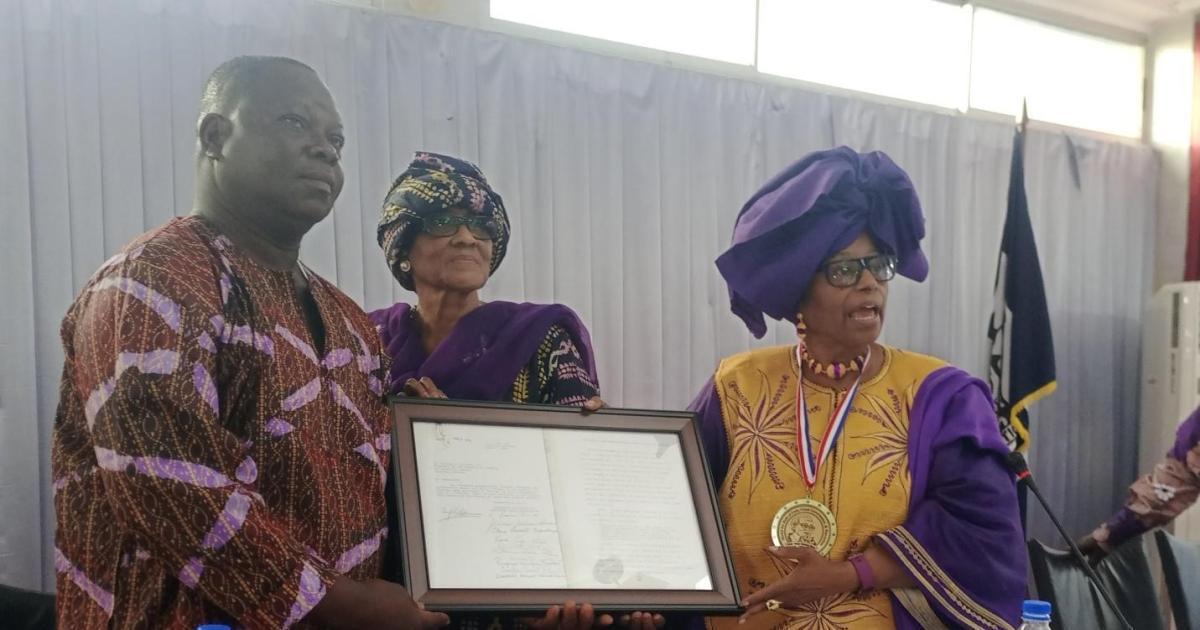Africa-Press – Liberia. Former President Ellen Johnson Sirleaf has said that Liberia owes the late legal icon and former Circuit Court Judge, Emma Shannon Walser a debt of gratitude for living up to the ethics and dictates of the legal profession and standing up for the rights of powerless Liberians in the face of oppression.
Sirleaf said that the life that the deceased Judge lived and the examples she set helped many Liberians find the courage to hold on to their own moral compass and to show solidarity with those seeking a better Liberia.
In a tribute paid at the memorial service, the former president described Liberia’s first female Circuit Court Judge as “unparalleled in the history of Liberia’s Judiciary.”
“I have the highest respect and regard for Judge Walser, and I believe that she is unparalleled in the history of Liberia’s Judiciary,” Sirleaf said. “That is why the state, during my regime, honored Judge Walser when she served as 2006 Independence Day’s orator.”
The memorial service that took place in Monrovia on June 8, 2023, at the Temple of Justice, was to honor the late Judge Walser’s significant role and her contribution to Liberia’s Judiciary. The service was also meant to present a petition of Concern Women for Justice and Walser’s legacy to the Liberia National Museum to be preserved.
Judge Walser died on May 28, 2021, in Geneva, Switzerland, at the age of 92. The memorial service in Monrovia was organized by the Liberian Institute for Growing Patriotism (LIGP), the Angie Brooks International Center (ABIC), and the Association of Female Lawyers of Liberia (AFELL).
Former President Sirleaf described Walser as a “unique woman,” as she was the only female judge in Liberia who stood firm and was visible for the right to the full respect of individual and collective human rights.
“I have used the word unparalleled, and this is no exaggeration. Emma was unique. No other Liberian judge before or since has ever stood so firmly and so visibly for the right to the full respect of individual and collective human rights,” Sirleaf said. “She joined a demonstration that was held by some brave young Liberians in her judicial robes and was epitomizing the ideal that justice must be seen and felt by the ordinary Liberian.”
Many Liberians consider the late Judge to be a woman who had a keen sense of justice and was well known as a progressive and liberal judge. Her father, Eugene Himie Shannon, also served as Chief Justice of the Supreme Court of Liberia.
She was known as strong and would not bow to political pressure. She was also known historically for, among other things, standing up to the government in the wake of the 1979 civil disturbances — refusing to condemn the alleged instigators of the 1979 Rice Riots and civil unrest. Her refusal led to her being summarily dismissed.
Her dismissal by the Tolbert government prompted a cross section of Liberian women, including young professionals and elders, amongst whom were several distinguished women as well as the leadership of the market women, to sign a petition of some 500 signatories that was taken to the Legislature in protest.
The matter also reached the Cabinet when then President Tolbert took it there and said, “The women of the nation are against me.”
But Liberia’s Ambassador to the Federal Republic of Nigeria, Ambassador Al-Hassan Conteh, who was a student at the University of Liberia at the time, said he admired the courage and strong will of the judge — prompting him to give her the nickname “Portia” from Shakespeare’s the Merchant of Venice, because of her sagacity in interpretation of the law.
Later in 2007, the Liberian People’s Party (LPP), one of the political entities born out of the progressive agitations, described Judge Walser as an advocate and champion of “participatory democracy” in Liberia.
River Gee County Senator Conmany B. Wesseh, who served as the keynote speaker at the service, described the late Judge Walser as an extraordinary woman who lived a life that impacted many Liberians.
“She was well respected at the University of Liberia, where I served as the Student Council president,” Wesseh said, adding that the deceased was associated with all of the events that were trying to deal with the problems that Liberia was heading toward.
“Judge Walser stood much as she was a judge in these campaigns and her voice was clear that where the leaders of Liberia were heading could lead Liberia to trouble, but they didn’t listen to her voice.
The senator noted that Judge Walser was the first contributor to the Amos C. Sawyer campaign that was held in Monrovia. “She gave me US$500 and said you should fight this law,” he added.
Former Minister of Foreign Affairs, who is the Executive Director of LIGP, and Chair of the Board of ABIC, Olubanke K. Akerele, said LIGP was launched nearly ten years ago 2013 under the auspices of ABIC in honor of Judge Walser. “It was in the name of Judge Walser that the institute came into existence, and the institute is about developing patriotism and contributing, identifying all levels of society,” she said.
She noted that the second item for which the memorial was held is about the most critical dimension of the judge’s tenure without being the most significant for the nation’s judiciary and the legacy that was involved in the joint resolution by the Liberian legislature that removed her judgeship in 1979.
For his part, Albert S. Markeh, Director of the National Museum of Liberia (NML), who received the petition for the legacy project, said the museum is proud to be associated with such an endeavor.
For More News And Analysis About Liberia Follow Africa-Press






